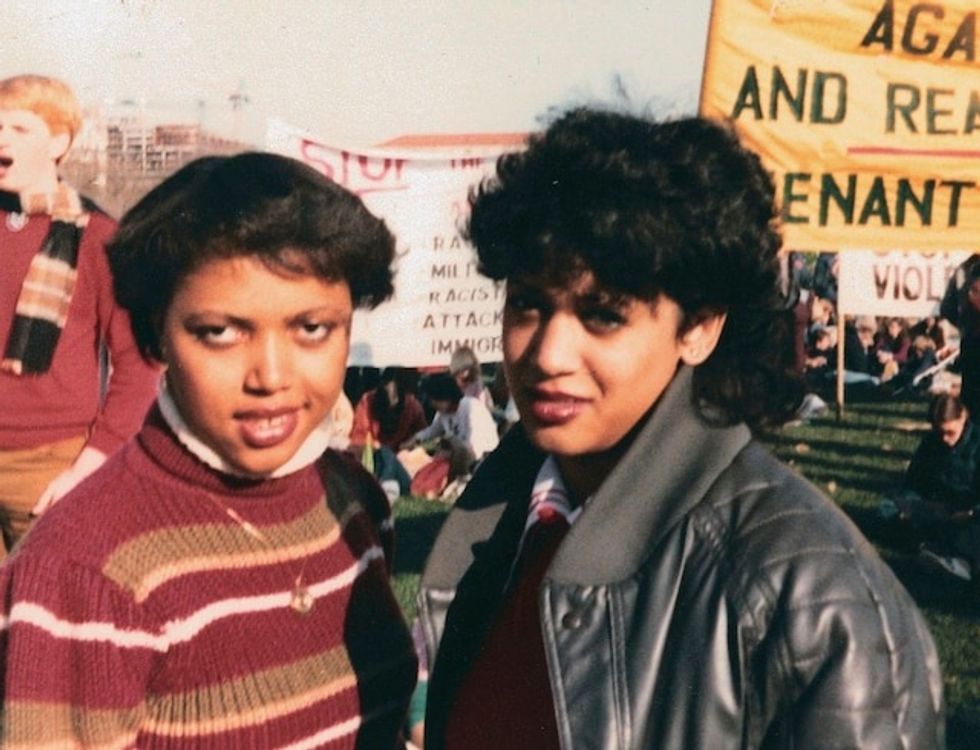Kamala Harris is a Howard grad like I am. Let me school you about what that means. | Jenice Armstrong, Philadelphia Inquirer, August 12, 2020.
I was at Howard University at the same time that Sen. Kamala Harris was.
She arrived on campus in 1982. I was a sophomore. I didn't know her. But like her, I attended liberal arts classes in Douglass Hall — named after the abolitionist Frederick Douglass — and walked across the same fabled Yard that so many African American historical figures have.
So, when people question her blackness, I point to that experience.
You can't be surrounded by that much blackness and not have emerged having been deeply influenced. I know I was. Being on that campus for four years affected my entire worldview. More than anything, it gave me confidence. I knew that even in a country with a history of being hostile to people who looked like me, I could achieve.
"I'll always remember walking into Cramton Auditorium for my freshman orientation," Harris wrote in her 2019 memoir, The Truths We Hold: An American Journey. "The room was packed. I stood in the back and looked around and thought, 'This is heaven!' There were hundreds of people and everyone looked like me."
I know I'll never forget those days. The early 1980s were an especially invigorating time to be on HU's campus. We thought of ourselves as the next generation of social activists. We were protesting apartheid in South Africa. We demonstrated for the late Rev. Dr. Martin Luther King Jr.'s birthday to be recognized as a federal holiday. Even on our own campus, we participated in civil rights-style sit-ins at the administration building to protest censorship of the student paper. Harris was active in student government and on the debate team. I worked on various campus publications and at the student radio station.
"That was the beauty of Howard," Harris wrote. "Every signal told students that we could be anything — that we were young, gifted and black and that we shouldn't let anything get in the way of our success."
While an undergraduate, she pledged Alpha Kappa Alpha, a prestigious sorority founded on HU's campus in 1908. Harris also was a sweetheart for Kappa Alpha Psi, a black fraternity headquartered in Philly.

Those are some pretty impressive Black credentials.
Yet, some people still persist in playing the "Yeah but is she really down with Black people?" game.
Granted, it's nothing new. But it really picked up on Tuesday after she was named Joe Biden's running mate.
Here's the thing: Although Harris is racially mixed — she's the daughter of a Black man from Jamaica and a mother from India — she doesn't run from her African heritage. She embraces it. Culturally, she's all in.
Former President Barack Obama went through something similar in 2008 when he first ran for president and voters were in a tizzy questioning his racial identity, not to mention his birthplace.
I wish that instead of picking apart Harris' racial makeup and playing the is-she-Black-enough game that people would invest more time in finding out where she stands on key issues such as criminal justice reform and health care.
Howard president Wayne A.I. Frederick had this to say about Harris Tuesday night on MSNBC: "For us at Howard University, it's a signature moment. She has stood on the shoulders of many who have gone before her, and now she gets to clear a path for many who will come after her."
As for me, I'm excited about seeing a woman on the ticket again. Harris is the first HBCU grad to ever make it this far. It's even sweeter that she's an alum from my school.
Not to be petty, but that will make for some awesome bragging rights the next time I am around some Spelman and Morehouse grads. I can hardly wait to see a Vice President Harris at one of Howard's epic homecomings.
###
August 13, 2020
Voices4America Post Script. I am a white woman, a graduate of a women's college, one of a group then called the 7 sisters.
Unlike the male Ivies or big state schools, we had women faculty in large numbers, women presidents on the walls to look at daily, and women alumnae as our visitors and distinguished predecessors.
4 years when femaleness was a given, a positive, not a detriment. 4 years which could cure the soul and give one the strength to face the sometimes unfriendly world outside the college's walls.
I have often thought of what it means that Kamala went to a black college. She was young, ambitious and was sorting out her black identity (what it meant as well as what others thought of her) when she chose an HBCU.
She has often said she chose Howard because Thurgood Marshall went there...that's ambition and identity.
Her parents taught at Berkeley (her mother) and Stanford (her dad) but she chose Howard, a black college.
Her faculty would have been largely black, the presidents of the college on the walls that she looked at daily would have been black, and black alumnae were the visitors/speakers and distinguished predecessors.
4 years when blackness was a given, a positive, not a detriment. 4 years which could cure the soul and give one the strength to face the sometimes unfriendly world outside the college's walls.
That tells us much about her...and she will deliver the votes from the Divine 9 (the Black sororities and fraternities). Those are powerful machines to deliver the black vote.
What does it mean to go to an HBCU?
Everything!
Now, what does it mean to have a black woman on the ticket?
To have a black woman in the room?
To have an HBCU graduate in the room?
Everything! Everything!
#InclusionMatters #BlackLivesMatter #BidenHarris2020

